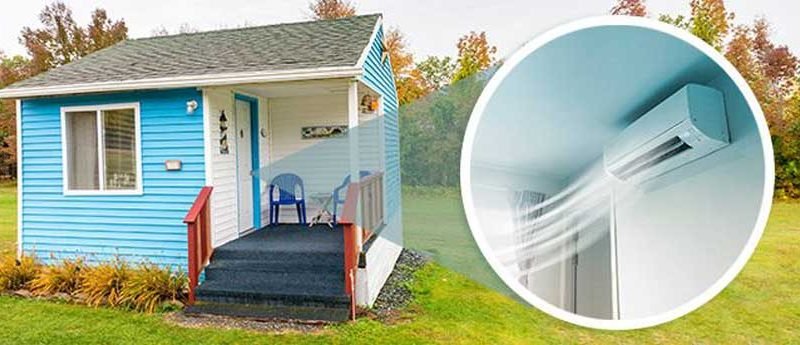Before you contact your HVAC company to discuss a new heating system, perhaps you should instead consider your options so you can discuss them with a qualified technician.
A certified HVAC technician can guide you through the best options when selecting the heating system for a new build or exploring options for replacing an existing unit.
Is It Time to Replace Your Furnace?
Your heating system will usually last around 15 years, but as it begins to age, it will start to show reduced signs of efficiency. You may also notice that you are experiencing more breakdowns that result in repair costs that add up over time.
You might also notice an increase in the amount you’re spending on energy to keep the system going. If your energy usage seems to be steadily increasing, it may be because your system is having to work harder to operate properly. You might even be experiencing corrosion that has developed over time. It may take the form of bits of rust, dirt, or dust being released through the vents in your home.
Tips for Choosing the Best Heating System
When shopping for a new furnace or going through your options with an HVAC professional, you may feel like there are too many choices that you may not fully understand. With a bit of education about what to look for when making a selection and the help of a heating technician, you should be able to navigate your way through your options. Here are some tips to help you choose wisely:
1. Fuel Source
Furnaces can be run with electricity, natural gas, propane, or oil. If you already have one of these fuels set up for the existing furnace in your home, your simplest option is to replace it with the same type of furnace. For instance, it is far easier to continue with an electric furnace if you don’t already have gas lines or an oil tank installed.
You may not even have this option, depending on your location. However, if you can make the switch and can afford the added costs of installation, you might find savings in a more efficient and less expensive fuel source.
2. System Type
Many homes have a packaged HVAC system that provides them with heating and cooling modes. Other households make use of split systems that have a separate heating component. You should discuss the benefits of both systems and determine which one is best for your heating and cooling needs, especially if you are looking at whether to replace an existing heating-only system but also have a cooling system that could use upgrading soon. This might be a great time to combine systems.
3. Unit Type
Once you’ve determined what fuel source you’ll use, you need to decide what kind of system to need to go with it. If you are going to use oil, you can choose from horizontal, waste, upflow, or downflow models. Each one uses oil, but in different ways, and they vary in size. The amount of space you have available may dictate what you choose. A trained professional can help you make this choice.
4. Zoning
If your home has hot and cold spots or various inhabitants have different temperature preferences, you might want to put some thought into what kind of system is best to create different zones. These systems allow you to divide different sections of your home into zones and maintain them at separate temperatures.
5. Costs
If you are like many homeowners, one of your biggest concerns with purchasing a new system is the costs involved. You will want to consider the price of the system purchased, but also the cost of installation, fuel, and upkeep. Your furnace will be priced according to its efficiency rating, features, and size.
6. Size
You should always choose the correct size heating system for your living space. A unit that is too small will lead to poor heating ability. Likewise, getting a unit that is too large can be a problem. You should always have an HVAC professional come out to assess your needs and give you a quote. A certified technician will be able to determine the size unit you require, the type that best suits your home, and provide you with quotes for the equipment they recommend.
7. Installation
The person installing your new heating system is just as important as what equipment you select. If improperly installed, your unit may not work as efficiently as designed. In some cases, you may experience unnecessary failures. Always work with a reputable HVAC company with the certifications and references to put you at ease knowing the job will be performed properly.
8. Variable Speed Blowers
Furnaces have either a fixed-speed or variable-speed blower. Variable speed blowers vary the speed of the heat being blown into your home. This keeps the areas heated uniform. This type of blower also tends to be quieter than its constant speed counterpart.
9. Maintenance
When purchasing a considerable investment such as a new heating system, you will want to make sure you are protected against any issues that may arise. While the manufactures warranty will protect you to some degree, you will also want to consider entering into a service agreement with your HVAC company. These types of agreements usually include periodic inspections and tune-ups. They may also provide certain parts or repairs for free or at reduced costs.
10. Incentives
Certain energy-efficient furnaces or HVAC systems come with discounts or rebates from their manufacturer or your energy supplier. In some cases, you can even qualify for government incentives designed to help promote upgrades to cleaner systems. Talk with your installation professional to learn more about what’s available.
Conclusion
Sometimes, your heating system may just need a bit of maintenance such as cleaning, oiling parts, or other light repairs. However, if your heating system has reached the point where the costs to keep the system running exceed the cost of a new unit, you may want to explore your options and look for a new heating system. This will ensure that you’re always able to enjoy home comfort throughout the year.














Comments